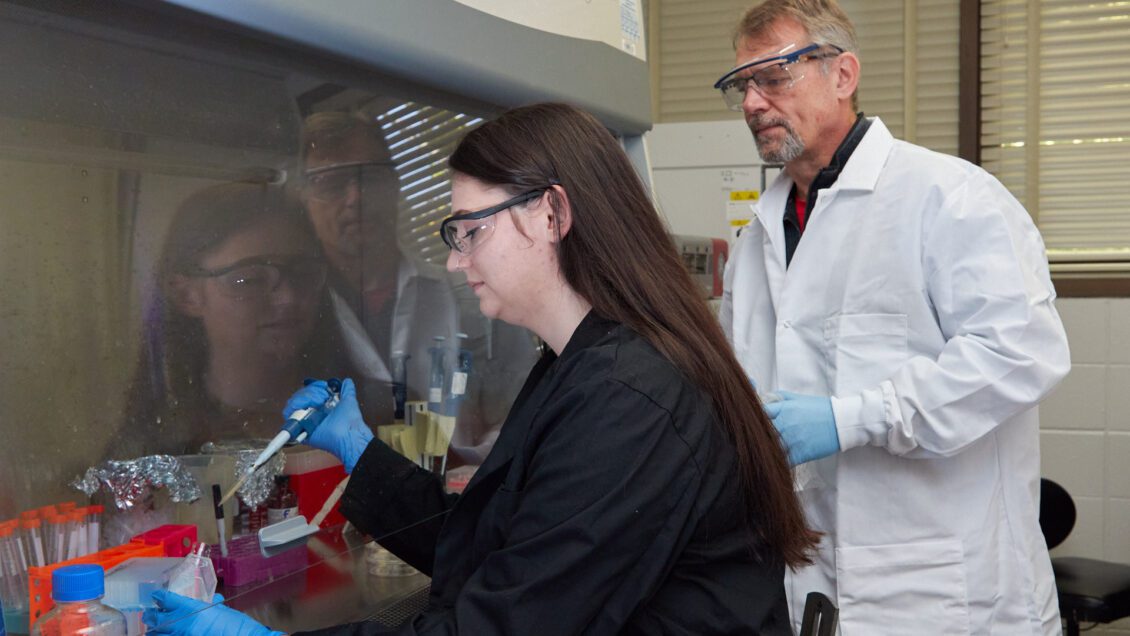Clemson University researchers have identified an enzyme and its products in humans that reduce diet-induced obesity.
But hold off before rushing out to order that double cheeseburger, French fries and chocolate milkshake. The discovery likely doesn’t mean you can eat a high-fat diet without repercussions, said William Baldwin, a professor and graduate program coordinator in the Clemson Department of Biological Sciences.
“The biggest thing is that we’re not done with our diet once we eat it,” said Baldwin, whose lab is interested in the metabolism of fatty acids and the role CYP2B genes play in diet-induced obesity. CYP2B is part of a superfamily of enzymes. It is the only human detoxification CYP whose loss is associated with obesity.
Not necessarily bad
Fat isn’t necessarily bad in and of itself.
It’s a source of energy, and some types of fat, such as omega-3 fatty acids found in salmon, flaxseed and walnuts, offer a wide range of health benefits. Omega-3 fatty acids may help lower triglycerides and raise high-density lipoprotein (HDL), often referred to as good cholesterol. They also may lower a person’s chance of developing heart and other diseases.
Omega-6 is another type of fat that is found in vegetable oils, nuts and seeds.
When we eat polyunsaturated fats, such as omega-3 and omega-6, they get metabolized by CYP2B6 into specific oxylipins. The oxylipins signal different receptors to tell the body what to do with the fats.

In the study, the researchers created model mice that had the human CYP2B6 gene. After feeding the mice a diet that was 60 percent fat, they found the female mice with the gene had less diet-induced obesity than those without. Male mice with the human CYP2B6 gene had less diabetes and better glucose tolerance, but increased nonalcoholic fatty liver disease, said Jazmine Eccles, a Ph.D. student in the Department of Biological Sciences.
“We believe the oxylipins signal the liver to take up the fats and get them out of your blood. That may be how we’re getting nonalcoholic fatty liver disease and improving some diabetes markers,” Eccles said. “Omega-6 fatty acids are the fat you get a lot of when you eat fried foods. They’re regarded as inflammatory. Your body is signaling to take up these fats, and you’re more apt to store fats instead of metabolizing them. If you eat a healthier diet with more Omega-3s, which are anti-inflammatory, you’ll potentially accumulate less of those fats.”
Expanding knowledge
Expanding knowledge about oxylipins could potentially lead to drugs that are metabolic activators and help reduce obesity, Eccles said. But any positives likely will come with a negative. If, for instance, a person comes from a family prone to fatty liver disease, they may not want to take something that increases signals to the liver to take up more fat. But for others, increasing those signals could clear out some of the fat from their bloodstream and reduce diabetes or cardiovascular disease, Baldwin said.

“I think there’s going to be lipids [fatty compounds] that are better than others. But I think, ultimately, we’re going to find that every one of the oxylipins we’re looking at will have two positives and one negative, or have two negatives and one positive,” Baldwin said.
He continued, “I don’t think the perfect molecule is out there. I think the perfect molecule is a healthy diet with reasonable amounts of omega-3 fatty acids and exercise.”
A paper titled “Human CYP2B6 produces oxylipins from polyunsaturated fatty acids and reduces diet-induced obesity” published in December in the journal PLOS One outlines the study’s findings.
Research reported in the paper was supported by several National Institutes of Health institutions, including the National Institute of Environmental Health Sciences grant R15ES017321 and the National Institute of General Medical Sciences P20GM121342. The content is solely the responsibility of the authors and does not necessarily represent the official views of the National Institutes of Health.
The College of Science pursues excellence in scientific discovery, learning, and engagement that is both locally relevant and globally impactful. The life, physical and mathematical sciences converge to tackle some of tomorrow’s scientific challenges, and our faculty are preparing the next generation of leading scientists. The College of Science offers high-impact transformational experiences such as research, internships and study abroad to help prepare our graduates for top industries, graduate programs and health professions. clemson.edu/science
Get in touch and we will connect you with the author or another expert.
Or email us at news@clemson.edu

